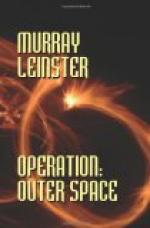This was the second-stage rocket-phase. The moon-rocket had blasted off at six gravities acceleration until clear of atmosphere and a little more. Acceleration-chairs of remarkably effective design, plus the pre-saturation of one’s blood with oxygen, made so high an acceleration safe and not unendurable for the necessary length of time it lasted. Now, at three gravities, one did not feel on the receiving end of a violent thrust, but one did feel utterly worn out and spent. Most people stayed awake through the six-gravity stage and went heavily to sleep under three gravities.
Cochrane fought the sensation of fatigue. He had not liked himself for accepting the orders that had brought him here. They had been issued in bland confidence that he had no personal affairs which could not be abandoned to obey cryptic orders from the secretary of a boss he had actually never seen. He felt a sort of self-contempt which it would have been restful to forget in three-gravity sleep. But he grimaced and held himself awake to contemplate the unpretty spectacle of himself and his actions.
The red light said: “Second stage ends ten seconds.”
And in ten seconds the rockets hiccoughed once more and were silent, and there was that sickening feeling of free fall, but he grimly made himself think of it as soaring upward instead of dropping—which was the fact, too—and waited until the third-stage rockets boomed suddenly and went on and on and on.
This was nearly normal acceleration; the effect of this acceleration was the feel of nearly normal weight. He felt about as one would feel in Earth in a contour-chair tilted back so that one faced the ceiling. He knew approximately where the ship would be by this time, and it ought to have been a thrill. Cochrane was hundreds of miles above Earth and headed eastward out and up. If a port were open at this height, his glance should span continents.
No.... The ship had taken off at night. It would still be in Earth’s shadow. There would be nothing at all to be seen below, unless one or two small patches of misty light which would be Earth’s too-many great cities. But overhead there would be stars by myriads and myriads, of every possible color and degree of brightness. They would crowd each other for room in which to shine. The rocket-ship was spiralling out and out and up and up, to keep its rendezvous with the space platform.
The platform, of course, was that artificial satellite of Earth which was four thousand miles out and went around the planet in a little over four hours, traveling from west to east. It had been made because to break the bonds of Earth’s gravity was terribly costly in fuel—when a ship had to accelerate slowly to avoid harm to human cargo. The space platform was a filling station in emptiness, at which the moon-rocket would refuel for its next and longer and much less difficult journey of two hundred thirty-odd thousand miles.




